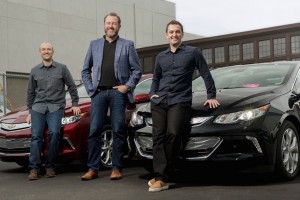
The deals to get to the top of the autonomous vehicle market are picking up with Qualcomm's $38 billion deal with NXP following others like, GM's investment in Lyft.
Automakers have been scrambling to gain an edge over one another to bring the first viable autonomous vehicle to the market. Already tough competition has been made more difficult with tech behemoths like Google and, potentially, Apple in the fray.
Add in Qualcomm now after its announcement that it agreed to acquire NXP Semiconductors for about $38 billion. NXP owns about 14% of automotive semiconductor sales globally and those semiconductors are crucial to the advent of the self-driving car.
“With innovation and invention at our core, Qualcomm has played a critical role in driving the evolution of the mobile industry,” Qualcomm CEO Steve Mollenkopf said in a statement.
“The NXP acquisition accelerates our strategy to extend our leading mobile technology into robust new opportunities, where we will be well positioned to lead by delivering integrated semiconductor solutions at scale.”
The deal actually gives Qualcomm a leg up on competition in a variety of markets, including mobile communications, the Internet of Things and security, and networking. It also means its picking up competitors in those industries as well, including Infineon Technologies AG, Renesas Electronics, STMicroelectronics NV and Texas Instruments.
“By joining Qualcomm’s leading SoC capabilities and technology roadmap with NXP’s leading industry sales channels and positions in automotive, security and IoT, we will be even better positioned to empower customers and consumers to realize all the benefits of the intelligently connected world,” Mollenkopf said.

Automakers are being challenged by technology companies, like Google and Apple, for superiority in the self-driving car market place.
Qualcomm’s move is just one of many deals in recent months aimed the autonomous vehicle market. General Motors spent $1 billion on Cruise Automation Inc. and then dropped another $500 million for a stake in Lyft Inc. with the goal of introducing self-driving cars as soon as next year.
(EVs, autonomous vehicles hasten auto industry transformation. Click Here for the details.)
Uber Technologies recently announced a deal to purchase Otto for $680 million. Otto, which begins long-haul freight service next year, recently completed a completely autonomous delivery of beer in Colorado.
The 120-mile trip between Fort Collins and Colorado Springs, demonstrates that autonomous vehicles won’t be just for everyday commuters who’d rather do the crossword than drive.
It’s likely the pace and number of these deals will continue accelerating as the reality of an autonomous vehicle is approaching more quickly than expected. In fact, Tesla’s recent announcement that its new vehicles are capable of Level 5 autonomy only brings that in to clear focus.
(Click Here to see more about Otto’s first autonomous delivery.)
GM, Ford, Google and a slew of suppliers, like Bosch, Delphi and Mobileye are racing to ensure that when the federal government gives the go-ahead, deliveries of self-driving cars, SUVs and trucks to dealerships will commence immediately.
And that “go-ahead” is a top priority for the Obama Administration as it winds down its tenure. The Department of Transportation recently released its guidelines for testing autonomous vehicles, which should streamline the process of getting the technology validated.
The government is eager to see the technology implemented because transportation officials believe it’s the key to eliminating traffic fatalities in the U.S. In fact, the Obama Administration set a goal of zero traffic fatalities in 30 years with connectivity and autonomous vehicles being the lynchpins to success.
(Tesla CEO Musk warns that critics of autonomous vehicles are “killing people.” For the story, Click Here.)
The administration also set forth guidelines for autonomous vehicle testing and development aimed at accelerating the timeline for getting those vehicles from the workshop to the highway. Once technological and regulatory issues are resolved, up to 15% of new vehicles could be autonomous, a recent study showed.
